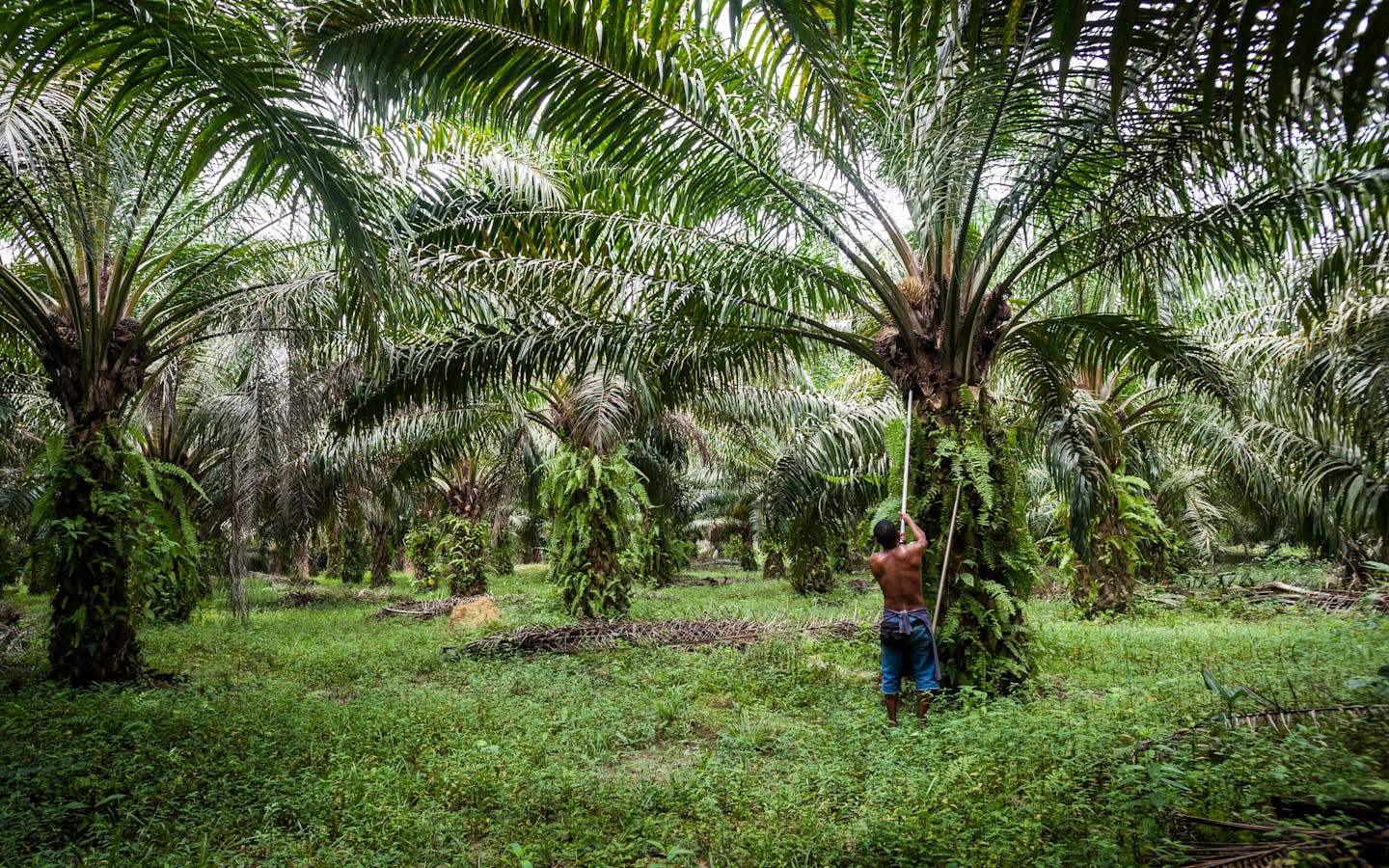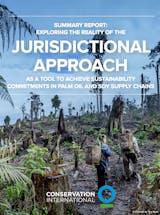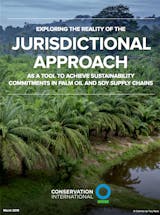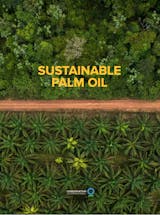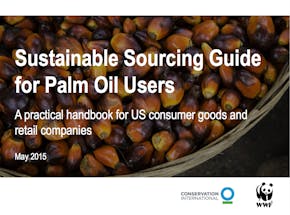Found in half the products on supermarket shelves, palm oil is the most widely used vegetable oil in the world.
Global demand has surged in recent years for this extremely versatile and efficiently produced oil — oil palm trees produce up to 10 times more oil per hectare than any other crop. Though palm oil accounts for nearly 40 percent of the world’s vegetable oil market, it uses less than 10 percent of the land dedicated to oil crops.
Yet, rapid expansion of oil palm plantations has brought about serious environmental and social consequences such as deforestation, draining and burning of peatlands, and land conflict with rural communities -- especially in Indonesia and Malaysia, where 85 percent of the world’s oil palm is grown.
A coordinated global effort — from companies, governments, civil society and other stakeholders — has brought progress. Both Indonesia and Malaysia saw historic lows in palm-oil-driven deforestation in 2021, though it has edged higher since – a sign that more work remains to be done to make palm oil more sustainable.
Our plan
Conservation International works with partners across the palm oil value chain to accelerate measures that help small farmers adopt sustainable practices that reduce environmental impacts and improve livelihoods.
Transforming supply chains
Conservation International works with companies across the supply chain to support good practice in palm oil production and sourcing.
We work with producers to support the adoption of sustainable and regenerative practices that increase productivity on existing plantations and reduce impacts on nature. This includes working directly with independent smallholders — providing training and technical assistance to help them meet regulatory and supply chain requirements for sustainable and deforestation-free palm oil. It also includes increasing their income through improved productivity and access to financial incentives for sustainable production through certification or directly negotiated premiums from local mills.
At the same time, we are working with consumer goods and retail companies to:
- Establish sustainable sourcing strategies based on the standards set by the Roundtable on Sustainable Palm Oil (RSPO).
- Build robust traceability systems and use that data to inform sourcing decisions and prioritize suppliers and landscapes for further action and engagement.
- Assess how palm oil supply chains impact and rely on nature, and help companies set science-based targets for nature.
- Invest in sustainable production, conservation and restoration initiatives in key production landscapes and work with local stakeholders to encourage collective action.
From no-deforestation to nature-positive
Recognizing the urgency for company and supply chain action on nature and climate, Conservation International is working directly with companies to establish corporate nature commitments in line with the impacts of their commodity sourcing. We have supported several companies to conduct supply chain assessments for a wide range of commodities, including palm oil, soy, cattle products, coffee, cocoa, rubber, tuna, shrimp and others. Using this information, we worked closely with these companies to set commitments and targets for nature, as well as to design the implementation strategies and project portfolios that contribute to the delivery of their conservation, restoration and sustainable production objectives in key production and sourcing landscapes.
Learn more about this work: Partnering with the Private Sector to Develop and Advance Nature Targets.
Transforming production landscapes
Addressing the challenges of deforestation and social conflict goes beyond the scope of any single company or commodity. That’s why Conservation International supports engagement and investment in landscape or jurisdictional approaches to sustainable development. This means bringing together stakeholders from the government, private sector, civil society and other areas to set common targets and commit to coordinated action that supports conservation, restoration and sustainable production in a particular landscape (defined by ecological boundaries like a watershed or eco-region) or in a jurisdiction (defined by a government boundary like a district or municipality).
Conservation International encourages companies to identify the operating and sourcing regions where they can reduce negative impacts and support positive outcomes for people and nature by engaging suppliers, investing directly in projects, and supporting landscape and jurisdictional initiatives that enable improved resource management and governance across multiple stakeholders.
We also work through our field programs and partners in priority landscapes.
- Tapanuli Sustainable Landscape Initiative in North Sumatra, Indonesia
In the South Tapanuli district, more than 90,000 hectares (222,000 acres) is planted with oil palm. Yet, it retains more than 80 percent forest cover. These forests are not only critical to local livelihoods, they also regulate the climate and rainfall, prevent floods and landslides, and provide habitats for some of Sumatra’s most iconic species, like the Sumatran tiger and Tapanuli orangutan. Konservasi Indonesia, as the key implementation partner of Conservation International, collaborates with local and provincial government to enhance forest management and monitoring, restore degraded lands and support improved legality and agroforestry livelihoods through social forestry programs. Konservasi Indonesia also works closely with the local Sustainable Palm Oil Forum (FoKSBI) to improve collaboration across the palm oil sector in South Tapanuli and provides direct support to independent oil palm smallholders to adopt sustainable practices, improve their productivity and access additional revenue through certification with the Roundtable on Sustainable Palm Oil (RSPO).
Learn more about how companies like Unilever and P&G are supporting projects that contribute to landscape outcomes for people and nature in North Sumatra.
- Northern Amazonian Landscape in Sucumbíos and Orellana Provinces, Ecuador
The Northern Amazon landscape is a rich mosaic of productive land, forests and Indigenous lands — nearly half of the landscape is Indigenous territories and 68 percent is covered by forest. It is also a growing frontier for oil palm production, as well as cocoa, coffee and cattle. Here, Conservation International-Ecuador is working with government, private sector (including local palm oil mills), small farmers, civil society and others to implement an integrated landscape action plan that protects forests and improves connectivity, while supporting farmer livelihoods. Through conservation agreements, Conservation International is providing training to farmers and local communities to improve the productivity of oil palm and other crops and supporting access to incentives, including premium prices from local palm oil mills for adopting sustainable production practices and payments in exchange for forest conservation actions via the government’s Socio Bosque program. The Northern Amazon Landscape is also a key pilot landscape for Ecuador’s national commitment to achieve jurisdictional certification through the RSPO.
Learn more about Conservation International-Ecuador’s work, including the Business Case for Sustainable Landscape Action and P&G’s investment in protection and sustainable management of forest and Indigenous areas.

Supporting policy
Governments play a critical role in driving sustainable palm oil. Conservation International works to support local, national and international policy initiatives that create incentives for more sustainable palm oil production and do not directly or indirectly contribute to deforestation or social conflict.
We work closely with local and national governments to provide scientific advice to inform natural resource planning and decision-making. In Indonesia, we work with Konservasi Indonesia to support local farmers in achieving Indonesian Sustainable Palm Oil (ISPO) certification and we also engage in multi-stakeholder platforms like the Sustainable Palm Oil Forum (FoKSBI). In Ecuador, Conservation International-Ecuador is working closely with the government to support implementation of the REDD+ National Palm Oil Action Plan and to establish a model for jurisdictional certification under the RSPO. We are also supporting collective action through multi-stakeholder platforms like the Interinstitutional Committee for Sustainable Palm Oil Production (CISPS), which works at a national level, and the Inclusive Table for Deforestation Free Palm Oil Production in the Northern Amazon Landscape.
In recent years, there has also been a proliferation of market-side regulation aimed at strengthening due diligence requirements for imported commodities to address deforestation and human rights issues. Conservation International supports efforts to enhance accountability on deforestation, and we encourage policymakers to integrate safeguards for smallholders, as well as financial support to help producer countries achieve compliance.

Fostering collaboration
Conservation International is actively involved in multi-stakeholder initiatives designed to support sector- and landscape-level transformation of the palm oil sector. These include:
- Roundtable on Sustainable Palm Oil (RSPO), the largest multi-stakeholder platform focused on driving sustainability in the palm oil sector. RSPO maintains the leading certification standard for sustainable palm oil production and trade.
- High Carbon Stock Approach (HCSA), a collaborative initiative focused on providing the methodology, tools and guidance for implementing no deforestation commitments.
- Coalition for Sustainable Livelihoods (CSL), a place-based platform bringing together stakeholders from government, private sector and civil society to drive collective action and investment to support farmer livelihoods, sustainable production, conservation and restoration at scale in North Sumatra and Aceh Provinces.
By the numbers
- Palm oil is grown on approximately 30 million hectares (75 million acres) globally — an area the size of Italy.
- Palm oil is incredibly efficient — it makes up nearly 40 percent of the world’s vegetable oil trade but uses less than 10 percent of the total land devoted to oil crops like soy, sunflower, rapeseed and other oils.
- Globally, an estimated 7 million smallholders grow oil palm (RSPO 2022b).
- Demand for palm oil more than doubled between 2001 and 2020 — more than four times the growth in global food consumption (WEF and TFA 2021).
- Since 2000, oil palm expansion has driven deforestation globally, with an estimated 10.5 million ha of forests, including 3.5 million ha of primary forests, replaced by oil palm between 2001 and 2015 (WRI n.d).
Contact
Melissa Thomas
Senior Director, Sustainable Palm Oil
mthomas@conservation.org
Katie Thomason
Manager, Sustainable Food & Agriculture
kthomason@conservation.org
